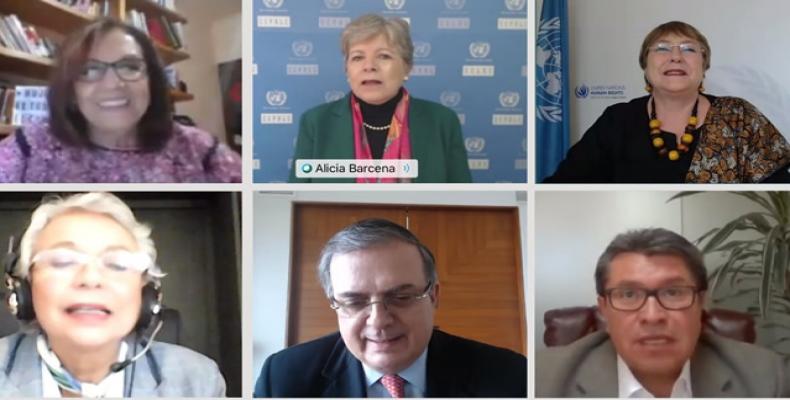The COVID-19 pandemic has important effects on women’s autonomy and gender inequality. That is why it is urgent that comprehensive public policies be adopted to achieve an economic reactivation that would guarantee women’s rights and gender equality, Alicia Bárcena, Executive Secretary of the Economic Commission for Latin America and the Caribbean (ECLAC), warned today during a discussion on women’s human rights and challenges in light of COVID-19, organized by Mexico’s Senate.
Bárcena was one of the main speakers at the gathering along with Michelle Bachelet, the United Nations High Commissioner for Human Rights. The virtual meeting was moderated by Malú Micher, President of the Mexican Senate’s Gender Equality Commission, and also included the participation of Marcelo Ebrard, Mexico’s Foreign Secretary; Olga Sánchez Cordero, the Mexican government’s Interior Secretary; María-Noel Vaeza, Regional Director of UN Women for the Americas and the Caribbean; Senator Mónica Fernández; Senator Ricardo Monreal; and the President of INMUJERES Mexico, Nadine Gasman; among other authorities from the Mexican Senate.
In her presentation, ECLAC’s Executive Secretary stressed that policies are needed to guarantee women’s rights and gender equality, especially for young women. These policies include expanding fiscal space and increasing the progressivity of tax systems; establishing a basic emergency income for six months that is equivalent to one poverty line; bolstering funding of key policies for women in the context of the pandemic, such as comprehensive services addressing gender violence; encouraging women’s participation in strategic sectors for the economic recovery (such as the maquila industry, tourism and services); protecting migrant women; supporting women in micro, small and medium-sized enterprises with financing, market access and training; and investing in the care economy as an economic driver.
“The social impact of the pandemic has the face of a woman,” Alicia Bárcena stated. She recalled that the economic drop expected for 2020 (-5.3%) will add 12 million more people to the ranks of the unemployed and will increase poverty by 29 million more people (to reach a total of 215 million people). According to ECLAC’s calculations, around 110 million women in the region will likely find themselves in situations of poverty. In addition, 54.3% of women are employed in sectors that are precarious in terms of wages, without formalized employment or job security, not to mention access to social protection.
In addition, the confinement measures ordered due to lockdowns have fostered situations of extreme violence and have limited women’s access to health services, including sexual and reproductive health services, and those providing psychosocial support and justice. Furthermore, the crisis of care is intensifying in the region, especially for women in lower-income households. And gender wage discrimination persists among health professionals, where 72.8% of personnel are women, she explained.
“This is not a financial crisis, but rather one affecting people, health and well-being. An economic contraction has come about with both supply and demand at a standstill. To cope with this, the role of the State is indispensable, but it must be a social State, not an authoritarian one. Here the role of parliaments is essential for forging a new social compact that would guarantee a Universal Welfare State,” Bárcena indicated to the senators and other authorities present in the meeting.
“The backdrop of the pandemic is a culture of privilege, which naturalizes inequalities, discrimination and addresses equity instead of equality, with an assistance-based approach rather than empowerment. This crisis should prompt us to make a change in the development model,” she insisted. “We have three decades of concentration of wealth and overlapping inequalities, with fragmented and commoditized health systems.”
She also emphasized that the four constraints of gender inequality must be lifted to strengthen the three dimensions of women’s autonomy (economic, physical and political). This entails moving from socioeconomic inequality and exclusionary growth to development patterns that would guarantee women’s substantive equality; moving from a rigid sexual division of labor and unfair social organization of care towards the redistribution of time, work and opportunities; moving from patriarchal, discriminatory and violent cultural patterns and from the predominance of a culture of privilege to a culture of rights and equality; and moving from concentrated power to democratic parity.
Alicia Bárcena also recalled that there are frameworks for action, such as the Santiago Commitment adopted by the XIV Regional Conference on Women in Latin America and the Caribbean in January 2020, which serves as a guide for implementing policies to confront the crisis in areas such as the care economy, a macro-economy based on equality, and measures to fight gender violence.
Furthermore, she stressed the importance of the rights of female environmental defenders, in a context in which violence against people who defend environmental issues has increased drastically, given that Latin America has the world’s highest percentage of people murdered for these motives. “The Escazú Agreement – which guarantees the right of all people to have access to information in environmental matters, to participate in the decisions that affect their lives and their surroundings, and to access justice when these rights have been violated – and the Montevideo Strategy – which seeks to foster the participation of women’s and feminist organizations and movements in the design, implementation, monitoring and evaluation of policies for mitigating and responding to the impact of adverse climatic phenomena, for disaster risk management, and for strengthening resilience at a regional, national, subnational and local level – are two instruments that guide us along this path,” she specified.
“We need a feminist future, with a recovery with equality and sustainability,” ECLAC’s highest authority asserted. “We need to build back better, but with equality to forge compacts and a universal social protection system.”
source: eclac


